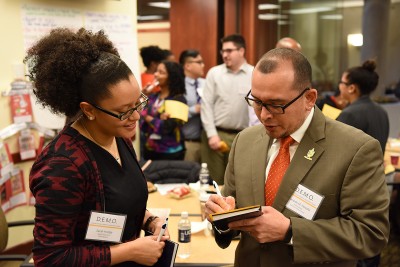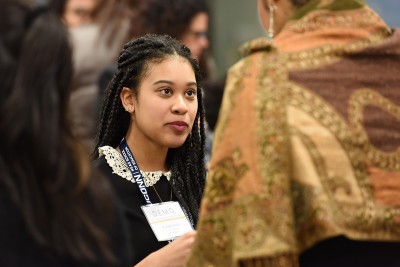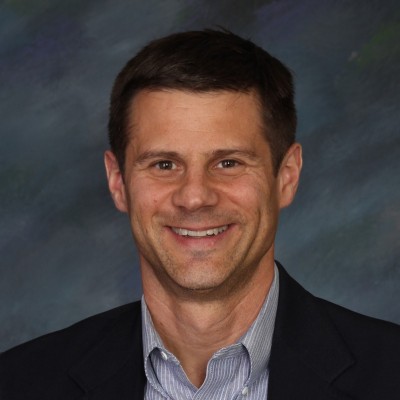For students of color interested in pursuing a career as a schoolteacher, the Neag School, in partnership with student-led organization Leadership in Diversity (L.I.D.), now offers a new source of inspiration: professional educators and administrators who have volunteered to offer their support and knowledge through a recently launched mentoring program.

Known as Diverse Educators Making Outstanding Change (D.E.M.O.), the mentoring program is designed for students enrolled – or those with an interest in enrolling – in the Neag School’s five-year Integrated Bachelor’s/Master’s (IB/M) Program.
According to Neag School assistant professor Joseph Cooper, who serves on the D.E.M.O. committee, the mentoring program has been created to improve achievement, retention, and engagement among students of color in the Neag School’s pre-teaching and teaching programs. Such a mentoring program may be especially vital at this time, given the disproportionate number of students of color to teachers of color in the state of Connecticut. According to the State Education Research Center, almost half of Connecticut students are of color, whereas less than one in five teachers are of color.
“The Neag School of Education’s program is the first to pair a mentor with a mentee of color in the K-12 education system,” Cooper says. “We want every student to be confident in their ability to grow and to impact change.”
“[D.E.M.O.] is a sign of the investment the Neag School is making in developing social and emotional safety for all students, but particularly for students of color who feel isolated in some of their classes and field experiences.”
—Vonetta Romeo-Rivers, D.E.M.O. mentor
The effort to launch D.E.M.O., says Neag school academic advisor Mia Hines, stemmed from the School’s ongoing work with the American Association of Colleges for Teacher Education (AACTE)’s Networked Improvement Community (NIC), which specifically aims to increase the percentage of black and Latino males within teacher preparation programs. Today, only 2 percent of public school teachers are black males, and even fewer are Latino, according to the National Center for Education Statistics.
“D.E.M.O. was formed because we are not only looking to increase our recruitment and retention efforts of black and Latino males, but all students of color,” Hines says. “Our hope is to increase the amount of students of color interested in teaching – which will, in return, increase the number of students and mentors we have within our D.E.M.O. program.”
Creating Connections
This past January, D.E.M.O. hosted a kickoff event to help connect students of color in the Neag School teacher preparation program with mentors, who are all current teachers of color. Neag School student and aspiring schoolteacher Kimberly Duhart ’19 (ED) was among those to stand up and share her favorite elementary-school memory before the gathered crowd.
“My second-grade teacher was the one who helped me realize my potential,” Duhart said. “She put me in the school’s gifted and talented program when others teachers wouldn’t have put me there.”
Duhart’s inspiration and second-grade teacher, Dee Walters of Columbus Magnet School in Norwalk, Conn., also has joined the D.E.M.O. effort. She and Duhart were among the group of 87 mentors and mentees present at the Jan. 28 kickoff.
At the January event, mentees selected three potential mentors by engaging in a “speed mentoring” process similar to speed dating; each student had brief, yet engaging discussions with one mentor before striking up a new conversation with another. Mentors include practicing teachers, as well as education administrators and UConn faculty and staff.
Mentor Vonetta Romeo-Rivers, director of performance, evaluation, and talent development for Manchester Public Schools, says D.E.M.O. is a worthwhile investment that will help alleviate the isolation students of color may experience in the classroom.

“[D.E.M.O.] is a sign of the investment the Neag School is making in developing social and emotional safety for all students, but particularly for students of color who feel isolated in some of their classes and field experiences,” she says. “Listening to the stories [mentees] shared was sobering and reinforced the need for this type of venture. I’m honored to do my part.”
Cooper says each student in the program will likely be paired with a mentor within the month. In addition to the program’s larger, more formal events such as the D.E.M.O. kickoff, student organization L.I.D. will hold biweekly meetings with mentees. These smaller meetings will allow for in-depth discussion and time for mentor-mentee pairs to “unpack” challenges and possible solutions in the education system – starting with discussions regarding communication between educators, parents, and students of color.
Many educators, Cooper says, tend to communicate in a way that can stigmatize students of color, rather than using supportive language and showing awareness of these students’ backgrounds.
And this is where the Neag School and L.I.D. steps in, said Tracey Lafayette ’15 (ED), a curriculum and instruction student and L.I.D. president, on D.E.M.O. Night.
“Today we are creating connections,” she said. “Mentors know how hard it is to become teachers in a field where people don’t look like you.”
Neag Schol student and elementary education major Thu-Anh Nguyen ’17 (ED), who is Asian-American, says this new connection with a practicing teacher who can guide her in her career path is what drew her to the mentoring program.
“There aren’t a lot of Asian-American teachers, so our culture and beliefs aren’t explored in school,” Nguyen says. “We need to be able to promote those.”
Want to become a D.E.M.O. mentor? Contact Mia Hines at mia.hines@uconn.edu or Dominique Battle-Lawson at dominique.battle-lawson@uconn.edu for more information.
To learn more about the Neag School’s IB/M Program, visit teachered.education.uconn.edu.

